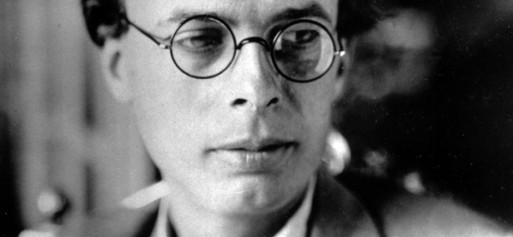Today, we associate LSD with a bygone era of dreadlocks, deadheads and free love. The psychedelic drug was at the center of Timothy Leary’s “turn on, tune in and drop out” culture, making headlines across the country as a fatal temptation for teens–a “scourge of the youth.”
But proceeding the peak years of the counter-culture, LSD was embraced as a drug with real medical and spiritual potential to aid the dying process.
A recent Open Culture article discusses the role that Alan Watts and Aldous Huxley played in exploring the potentials of the drug. Watts looked at psychedelics in relation to the teachings of Zen Buddhism, which he was beginning to popularize in America at the time. Meanwhile, Huxley wrote about the role mescaline could play in unlocking “the doors of perception” to the unconscious mind.
Huxley became so confident in LSD’s healing ability that his second wife Laura injected him with the drug as he lay dying. She consulted Sidney Cohen, a psychiatrist who had pioneered the use of LSD. “I had asked him if he had ever given LSD to a man in this condition. He said he had only done it twice actually,” states Laura, “and in one case it had brought up a sort of reconciliation with Death.”
“Go, go, let go, darling; forward and up. You are going forward and up towards the light. Willing and consciously you are going and you are doing [it] beautifully”–Laura Huxley to husband Aldous on his death-bed, 1963
Aldous Huxley had in fact “performed a similar service for his first wife as she died in 1955,” and he was described as having died a “graceful” and “very intelligent death” by both Laura and Watts. “Dying is an art,” Watts stated, while Laura added that it is “also an adventure” that merits proper planning and personal attention.
They were beliefs shared and expressed by Huxley in his book Island (1962), which, “as Watts points out, wasn’t intended as literature, but as a “sociological blueprint in the form of a novel”” that he wrote in deep reflection towards the end of his life.
Aldous was one of the most intriguing members of his already impressive family; the Huxley brood was renowned for turning out successful scientists, artists and writers. His most popular work is the dystopian Brave New World (1932), but it was Island that, as Laura says, “chose to look “not only [at] radical forms of living, but also, as Huxley himself demonstrated, radical ways of dying.” And although he was suffering from severely painful laryngeal cancer, Laura says “doctors and nurse[s] said they had never seen a person in similar physical condition going off so completely without pain and without struggle” as Aldous had with the aid of LSD.
Related article:

 An “Intelligent Form of Dying”: Aldous Huxley’s Psychedelic Death
An “Intelligent Form of Dying”: Aldous Huxley’s Psychedelic Death





 The Healing Sound of Singing Bowls
The Healing Sound of Singing Bowls
 “Summons” by Aurora Levins Morales
“Summons” by Aurora Levins Morales
 How To Dispose of a Body In Space
How To Dispose of a Body In Space














